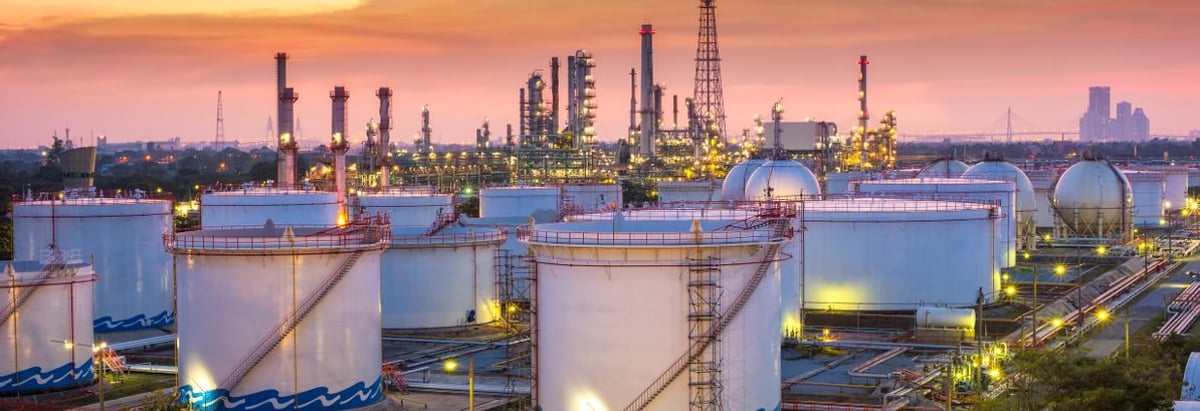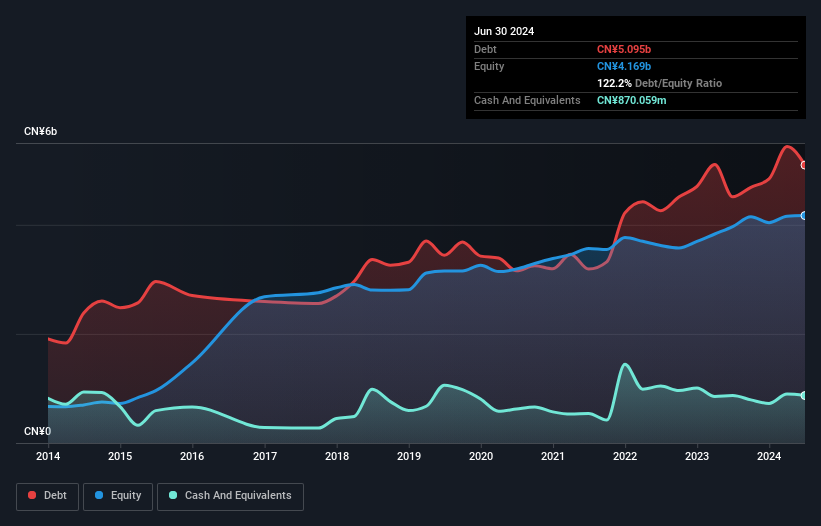
Some say volatility, rather than debt, is the best way to think about risk as an investor, but Warren Buffett famously said that 'Volatility is far from synonymous with risk.' It's only natural to consider a company's balance sheet when you examine how risky it is, since debt is often involved when a business collapses. Importantly, Guizhou Gas Group Corporation Ltd. (SHSE:600903) does carry debt. But the real question is whether this debt is making the company risky.
When Is Debt Dangerous?
Debt is a tool to help businesses grow, but if a business is incapable of paying off its lenders, then it exists at their mercy. In the worst case scenario, a company can go bankrupt if it cannot pay its creditors. However, a more usual (but still expensive) situation is where a company must dilute shareholders at a cheap share price simply to get debt under control. Of course, debt can be an important tool in businesses, particularly capital heavy businesses. The first step when considering a company's debt levels is to consider its cash and debt together.
View our latest analysis for Guizhou Gas Group
How Much Debt Does Guizhou Gas Group Carry?
As you can see below, at the end of June 2024, Guizhou Gas Group had CN¥5.09b of debt, up from CN¥4.51b a year ago. Click the image for more detail. However, because it has a cash reserve of CN¥870.1m, its net debt is less, at about CN¥4.22b.

A Look At Guizhou Gas Group's Liabilities
Zooming in on the latest balance sheet data, we can see that Guizhou Gas Group had liabilities of CN¥3.53b due within 12 months and liabilities of CN¥3.13b due beyond that. Offsetting these obligations, it had cash of CN¥870.1m as well as receivables valued at CN¥1.02b due within 12 months. So its liabilities outweigh the sum of its cash and (near-term) receivables by CN¥4.77b.
While this might seem like a lot, it is not so bad since Guizhou Gas Group has a market capitalization of CN¥8.73b, and so it could probably strengthen its balance sheet by raising capital if it needed to. But we definitely want to keep our eyes open to indications that its debt is bringing too much risk.
We measure a company's debt load relative to its earnings power by looking at its net debt divided by its earnings before interest, tax, depreciation, and amortization (EBITDA) and by calculating how easily its earnings before interest and tax (EBIT) cover its interest expense (interest cover). This way, we consider both the absolute quantum of the debt, as well as the interest rates paid on it.
Weak interest cover of 2.5 times and a disturbingly high net debt to EBITDA ratio of 6.3 hit our confidence in Guizhou Gas Group like a one-two punch to the gut. This means we'd consider it to have a heavy debt load. Worse, Guizhou Gas Group's EBIT was down 26% over the last year. If earnings continue to follow that trajectory, paying off that debt load will be harder than convincing us to run a marathon in the rain. There's no doubt that we learn most about debt from the balance sheet. But you can't view debt in total isolation; since Guizhou Gas Group will need earnings to service that debt. So when considering debt, it's definitely worth looking at the earnings trend. Click here for an interactive snapshot.
Finally, while the tax-man may adore accounting profits, lenders only accept cold hard cash. So the logical step is to look at the proportion of that EBIT that is matched by actual free cash flow. Over the last three years, Guizhou Gas Group saw substantial negative free cash flow, in total. While that may be a result of expenditure for growth, it does make the debt far more risky.
Our View
On the face of it, Guizhou Gas Group's conversion of EBIT to free cash flow left us tentative about the stock, and its EBIT growth rate was no more enticing than the one empty restaurant on the busiest night of the year. Having said that, its ability to handle its total liabilities isn't such a worry. Taking into account all the aforementioned factors, it looks like Guizhou Gas Group has too much debt. While some investors love that sort of risky play, it's certainly not our cup of tea. There's no doubt that we learn most about debt from the balance sheet. But ultimately, every company can contain risks that exist outside of the balance sheet. For instance, we've identified 3 warning signs for Guizhou Gas Group (2 don't sit too well with us) you should be aware of.
Of course, if you're the type of investor who prefers buying stocks without the burden of debt, then don't hesitate to discover our exclusive list of net cash growth stocks, today.
New: Manage All Your Stock Portfolios in One Place
We've created the ultimate portfolio companion for stock investors, and it's free.
• Connect an unlimited number of Portfolios and see your total in one currency
• Be alerted to new Warning Signs or Risks via email or mobile
• Track the Fair Value of your stocks
Have feedback on this article? Concerned about the content? Get in touch with us directly. Alternatively, email editorial-team (at) simplywallst.com.
This article by Simply Wall St is general in nature. We provide commentary based on historical data and analyst forecasts only using an unbiased methodology and our articles are not intended to be financial advice. It does not constitute a recommendation to buy or sell any stock, and does not take account of your objectives, or your financial situation. We aim to bring you long-term focused analysis driven by fundamental data. Note that our analysis may not factor in the latest price-sensitive company announcements or qualitative material. Simply Wall St has no position in any stocks mentioned.
About SHSE:600903
Guizhou Gas Group
Operates as a city gas and energy supply service provider in China.
Slight and overvalued.
Market Insights
Community Narratives



